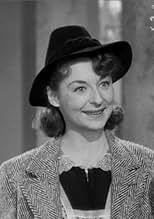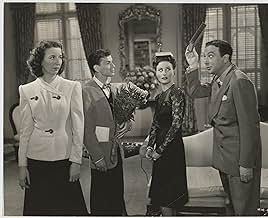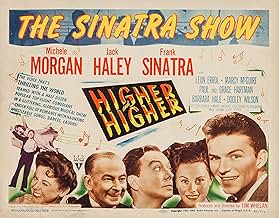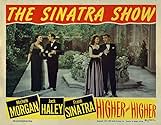Füge eine Handlung in deiner Sprache hinzuWith their employer bankrupt, servants scheme to marry maid Millie to a rich husband. But Frank Sinatra lives across the street...With their employer bankrupt, servants scheme to marry maid Millie to a rich husband. But Frank Sinatra lives across the street...With their employer bankrupt, servants scheme to marry maid Millie to a rich husband. But Frank Sinatra lives across the street...
- Für 2 Oscars nominiert
- 2 Nominierungen insgesamt
Michèle Morgan
- Millie Pico
- (as Michele Morgan)
Robert Andersen
- Announcer at Butler's Ball
- (Nicht genannt)
Paul Bradley
- Wedding Guest
- (Nicht genannt)
Ralph Brooks
- Restaurant Customer
- (Nicht genannt)
Tanis Chandler
- Debutante
- (Nicht genannt)
Empfohlene Bewertungen
Higher and Higher was one of Rodgers&Hart's lesser Broadway musicals it only had a run of 84 performances on Broadway in 1940. Yet it yielded one of their bigger hits It Never Entered My Mind.
Nevertheless except for one minor song, So Disgustingly Rich, the entire Broadway score was scrapped when RKO bought the film rights. Instead a whole new score by Jimmy McHugh and Harold Adamson was written, mostly to accommodate one Francis Albert Sinatra who was making his feature film debut.
Sinatra who had done some vocal cameos in previous films, takes a leaf from the page of his singing rival Bing Crosby. When Bing did his feature film debut in The Big Broadcast, he played Bing Crosby. Frank Sinatra took on the role of Frank Sinatra and I can't think of anyone who could have done a better job.
The Chairman of the Board is billed third here behind stars Jack Haley and Michele Morgan. He's the butler and she's the scullery maid to Leon Errol. In fact Errol is a millionaire who hasn't paid his help for seven months. Mainly because he's about to go belly up into chapter 11 or so he informs the staff.
Errol's a delightful old soul to work for and none of the staff want to lose a good thing. They pool their resources and get Michele Morgan to impersonate Errol's daughter who's over in Switzerland with her mother. The idea being to snag a rich bankroll in the hopes rescuing the family fortune. Only Michele starts looking at another.
It's a slight plot and certainly no worse than a whole lot of musicals, but RKO invested this film with a good cast of players. Barbara Hale and Elizabeth Risdon play another débutante and her mother who suspect something's not right, Victor Borge is a fortune seeking no account, Dooley Wilson, Paul Hartman, Grace Hartman, Marcy McGuire, Mel Torme and Mary Wickes, play others of the Errol household staff. Not a bad bunch at all.
Sinatra sang three good ballads all of them had some kind of commercial success, The Music Stopped, A Lovely Way to Spend an Evening, and I Couldn't Sleep a Wink Last Night. The last one was nominated for an Oscar for Best Song, but lost to Alice Faye's You'll Never Know.
1943 was the year of the Musician's Union Strike against the recording industry. To get their material out, Frank Sinatra recorded the songs from Higher and Higher with an acapella chorus for Columbia. Bing Crosby recorded songs from his film Dixie in the same manner for Decca. Both of them were denounced by the president of the union, James C. Petrillo as strikebreakers and both did not cross the picket line again. The strike wasn't settle completely until 1944 although Decca broke ranks earlier from the other record companies and settled earlier than Columbia, RCA Victor and the others.
The strike provided some anxious moments for Sinatra. He had just left the Tommy Dorsey Orchestra when the strike was called. It closed off a needed venue for his artistry when he wasn't sure whether leaving Dorsey would prove to be a right career move.
Fortunately Higher and Higher was received well a legend was launched.
Nevertheless except for one minor song, So Disgustingly Rich, the entire Broadway score was scrapped when RKO bought the film rights. Instead a whole new score by Jimmy McHugh and Harold Adamson was written, mostly to accommodate one Francis Albert Sinatra who was making his feature film debut.
Sinatra who had done some vocal cameos in previous films, takes a leaf from the page of his singing rival Bing Crosby. When Bing did his feature film debut in The Big Broadcast, he played Bing Crosby. Frank Sinatra took on the role of Frank Sinatra and I can't think of anyone who could have done a better job.
The Chairman of the Board is billed third here behind stars Jack Haley and Michele Morgan. He's the butler and she's the scullery maid to Leon Errol. In fact Errol is a millionaire who hasn't paid his help for seven months. Mainly because he's about to go belly up into chapter 11 or so he informs the staff.
Errol's a delightful old soul to work for and none of the staff want to lose a good thing. They pool their resources and get Michele Morgan to impersonate Errol's daughter who's over in Switzerland with her mother. The idea being to snag a rich bankroll in the hopes rescuing the family fortune. Only Michele starts looking at another.
It's a slight plot and certainly no worse than a whole lot of musicals, but RKO invested this film with a good cast of players. Barbara Hale and Elizabeth Risdon play another débutante and her mother who suspect something's not right, Victor Borge is a fortune seeking no account, Dooley Wilson, Paul Hartman, Grace Hartman, Marcy McGuire, Mel Torme and Mary Wickes, play others of the Errol household staff. Not a bad bunch at all.
Sinatra sang three good ballads all of them had some kind of commercial success, The Music Stopped, A Lovely Way to Spend an Evening, and I Couldn't Sleep a Wink Last Night. The last one was nominated for an Oscar for Best Song, but lost to Alice Faye's You'll Never Know.
1943 was the year of the Musician's Union Strike against the recording industry. To get their material out, Frank Sinatra recorded the songs from Higher and Higher with an acapella chorus for Columbia. Bing Crosby recorded songs from his film Dixie in the same manner for Decca. Both of them were denounced by the president of the union, James C. Petrillo as strikebreakers and both did not cross the picket line again. The strike wasn't settle completely until 1944 although Decca broke ranks earlier from the other record companies and settled earlier than Columbia, RCA Victor and the others.
The strike provided some anxious moments for Sinatra. He had just left the Tommy Dorsey Orchestra when the strike was called. It closed off a needed venue for his artistry when he wasn't sure whether leaving Dorsey would prove to be a right career move.
Fortunately Higher and Higher was received well a legend was launched.
Back in 1944 movie critics weren't given special screenings in order to review soon to be released films, but had to wait for a movie's regular opening to write their reviews. According to the host of American Movie Classics, when "Higher and Higher" first opened, film critics were unable to review Frank Sinatra's performance because the screams of adulation from the overwhelmingly young female audience drowned out all sound.
The first time I ever saw/heard Frank Sinatra was in the late 1960s and I couldn't understand why the women of my mother's generation made such a fuss about Mr. Sinatra. But after seeing this sensual and romantic crooner in "Higher and Higher" I can easily grasp why thousands of young women slept in the streets in order to be the first on line to see the young and appealing Mr. Sinatra.
The first time I ever saw/heard Frank Sinatra was in the late 1960s and I couldn't understand why the women of my mother's generation made such a fuss about Mr. Sinatra. But after seeing this sensual and romantic crooner in "Higher and Higher" I can easily grasp why thousands of young women slept in the streets in order to be the first on line to see the young and appealing Mr. Sinatra.
When the household staff of a wealthy family find out that their employers have gone broke, they concoct a dubious scheme: have new maid Millie (Michele Morgan) pretend to be the daughter of the rich family long enough to wed a wealthy suitor and get her hands on his money, after which she'll pay the other servants handsomely. Butler Michael (Jack Haley) manages the scheme despite having feelings for Millie himself, while next door neighbor Frank Sinatra (Frank Sinatra) keeps popping over to hit on Millie, as well as sing a few tunes.
The story is minor, and the humor thin, but it was fun seeing so many later major stars in early roles. Mel Torme looks like he's about 13 years old, Barbara Hale is youthful yet still mature, and Victor Borge is a long way from the goofball that I used to see on PBS so often in the 70's and 80's. The real draw is Sinatra, of course, playing a version of himself. He sings several songs, but doesn't have much acting to do. He's very thin and looks like he's wearing a suit 3 sizes too big. One of his songs earned an Oscar nomination for Best Song ("I Couldn't Sleep a Wink Last Night"), as did the film's score by C. Bakaleinikoff.
The story is minor, and the humor thin, but it was fun seeing so many later major stars in early roles. Mel Torme looks like he's about 13 years old, Barbara Hale is youthful yet still mature, and Victor Borge is a long way from the goofball that I used to see on PBS so often in the 70's and 80's. The real draw is Sinatra, of course, playing a version of himself. He sings several songs, but doesn't have much acting to do. He's very thin and looks like he's wearing a suit 3 sizes too big. One of his songs earned an Oscar nomination for Best Song ("I Couldn't Sleep a Wink Last Night"), as did the film's score by C. Bakaleinikoff.
This is one of my all-time favorites. Great music and some funny bits. I laugh every time at Millie, the maid pretending to be a débutante, holding her dainty hankie while chatting, and mindlessly polishing furniture with it as she chats. I just never can get past her French accent never being a problem as they try to pass her off as the boss's daughter.
Seeing a teenage Mel Torme and the very young Frank Sinatra singing is such a treat. My mom saw Frank Sinatra at a theater about the same time this movie came out. She said they couldn't clear the "bobby-soxers" out between movies (in those days you didn't have to leave between showings). This movie shows you how attractive and appealing the young Frank was and allows you to appreciate his early talent as well. And Victor Borge gets in a bit of his routine in, which is a bonus.
This is a fun movie with a sweet, simple storyline. Very enjoyable.
Seeing a teenage Mel Torme and the very young Frank Sinatra singing is such a treat. My mom saw Frank Sinatra at a theater about the same time this movie came out. She said they couldn't clear the "bobby-soxers" out between movies (in those days you didn't have to leave between showings). This movie shows you how attractive and appealing the young Frank was and allows you to appreciate his early talent as well. And Victor Borge gets in a bit of his routine in, which is a bonus.
This is a fun movie with a sweet, simple storyline. Very enjoyable.
While a far cry from a "great musical classic" HIGHER AND HIGHER does have its moments. Most of them are provided by the young Frank Sinatra. As part of the Frnak Sinatra DVD collections, this flimsy musical showcases him well. I kind of liked Sinatra as the youngish, cute and innocent characters he played in this first films and up to FROM HERE TO ETERNITY. That's when he lost the "boyishness" and became a mature actor, which he handled with ease. HIGHER AND HIGHER has a cute plot that's really kind of a fairy tale, but fun. The supporting cast is really good and makes up for the plot line and contrivences. Michelle Morgan is well cast as the scullery maid turned debutante for plot purposes. Never cared for Jack Haley, but everyone else was fun. Look for a young Barbara Hale and Mel Torme. Most of the songs are well done and Sinatra could do no wrong in any of his numbers. My favorite I COULDN'T SLEEP A WINK LAST NIGHT. For some light fun and breezy entertainment, I recommend HIGHER AND HIGHER.
Wusstest du schon
- WissenswertesRKO purchased the rights to the play for $15,000 ($254,000 in 2022), specifically to star Frank Sinatra, and the four songs he sings by Jimmy McHugh and Harold Adamson were written to accommodate his singing style. He was billed third because the contracts with Michèle Morgan and Jack Haley prevented higher billing.
- PatzerDuring the song "when it comes to love you're on your own" (c.62 minutes) the doorways have no panes of glass in them on the lower rows, as the house staff join in the song.
- Zitate
Mr. Green: Lovely thing you're playing, Victor. What is it?
Sir Victor Fitzroy Victor: It's a piano.
- SoundtracksIt's a Most Important Affair
(1943) (uncredited)
Written by Jimmy McHugh
Lyrics Harold Adamson
Sung by Mel Tormé, Marcy McGuire, Paul Hartman, Grace Hartman,
Martha Mears, Dooley Wilson, and Ivy Scott
Top-Auswahl
Melde dich zum Bewerten an und greife auf die Watchlist für personalisierte Empfehlungen zu.
- How long is Higher and Higher?Powered by Alexa
Details
- Erscheinungsdatum
- Herkunftsland
- Sprache
- Auch bekannt als
- Säg det med musik
- Drehorte
- Produktionsfirma
- Weitere beteiligte Unternehmen bei IMDbPro anzeigen
Box Office
- Budget
- 600.000 $ (geschätzt)
- Laufzeit1 Stunde 30 Minuten
- Farbe
- Seitenverhältnis
- 1.37 : 1
Zu dieser Seite beitragen
Bearbeitung vorschlagen oder fehlenden Inhalt hinzufügen

Oberste Lücke
By what name was Higher and Higher (1943) officially released in India in English?
Antwort

































